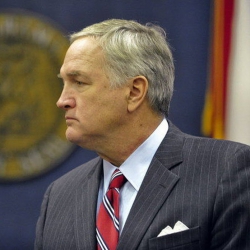
Luther Strange has been VictoryLand’s staunchest opponent, but he might soon be a US Senator from Alabama.
Alabama gambling halls lost two legal battles on Friday. One involved a major decision involving over 800 gaming machines which once belonged to the Greenetrack racetrack in Greene County. The other involved a lawsuit against VictoryLand in Macon County.
The Greenetrack case involved 825 gaming machines which were confiscated in a raid authorized by then-Alabama Attorney General Troy King. The gaming machines were seized in 2010 and Greenetrack wanted them returned to the property.
Illegal Slot Machines
Instead, a judge ruled that the EGMs were illegal slot machines under Alabama state law. The court rejected the argument that the machines were legal under Alabama laws that regulate bingo gaming.
The judge in the case wrote in his opinion, “All that is left is for the law of this State to be enforced.”
Lower Court Decisions on GreeneTrack EGMs
A lower court ruled that the state needed to return the slot machines to Greenetrack. In that earlier case, the judge said the machine complied with a local constitutional amendment which authorized electronic bingo machines in Greene County.
The Greenetrack case is not a direct part of the wider showdown between VictoryLand’s Milton McGregor and current Alabama Attorney General Luther Strange. VictoryLand was one of those racetracks raided prior to AG Strange’s term in office, but Milton McGregor won legal battles undoing much of the enforcement under Troy King.
Luther Strange’s Alleged Vendetta
During his time in office, some believe Luther Strange waged a personal vendetta against VictoryLand and the private racetracks in the state, perhaps due to resentment over Milton McGregor’s previous legal victories. In February 2013, VictoryLand was one of three racetracks which were raided by state and local law enforcement, at the behest of Luther Strange.
Eventually, VictoryLand, Birmingham Racecourse, and Mobile Greyhound Park won an Alabama District Court ruling, but Luther Strange refused to abide by that decision. That led to criticism from Gov. Robert Bentley, who eventually told state troopers they did not have to follow Luther Strange’s orders if they involved enforcement of gaming laws. With Luther Strange now running for the empty seat of Sen. Jeff Sessions — who is set to become the U.S. Attorney General — Milton McGregor and the three racetracks can only hope Luther Strange wins a senate seat and vacates the AG’s office.
VictoryLand Lawsuit
Meanwhile, VictoryLand is facing a lawsuit from three women who say the dogtrack refused to pay their winnings: Marie Hoffman, Sandra R. Howard, and Dianne Slayton. In all three cases, the women say they won slots jackpots, but racino staff informed them that the gaming machines had malfunctioned.
Lost Jackpots at VictoryLand
Marie Hoffman said she won two different jackpots in 2008, worth a combined $110,000. Dianne Slayton won a $50,000 jackpot in 2009, only to be told the machines were malfunctioning. Sandra Howard’s suit is more complicated, because it alleges that former Birmingham Mayor Larry Langford (now serving time in prison on bribery charges) was taken to a specific slot machine by VictoryLand officials — a machine which produced a $50,000 jackpot for the mayor.
A judge ruled that all three cases should proceed in the civil justice system. VictoryLand lawyers argued that the cases should be handled by an arbitrator, as the slot machine’s bylaws required. The judge ruled that the casino cannot enforce its rules over disputed jackpots through arbitration.
The cases of Marie Hoffman and Dianne Slayton beg certain questions. If VictoryLand knew of these glitches, why did they not find fixes for them when the first malfunction happened? If Marie Hoffman knew that VictoryLand might not pay her winnings, why did she keep gambling on the machines after her first jackpot was not paid? Both sides have questions to answer.
Greenetrack and VictoryLand Closed
Greenetrack and VictoryLand both are classified as greyhound tracks by the Greyhound Tracks of America website, but do not conduct live racing at the moment. Over the past generation, dog tracks and horse tracks have declined considerably. As more gaming opportunities have opened for gamblers — tribal casinos, mulitstate lottery associations, online gambling — people have visited the racetracks less often. In many states, casino-style betting in the form of slot machines, video lottery terminals, or even table games have been legalized for racetracks.
In states where the racetracks are not allowed to house casino gambling, those venues have closed and the local horse training and dog training industries have withered. Alabama allows casino style gambling at three tribal casinos owned by the Poarch Indians, but does not allow casino betting at racetracks.
